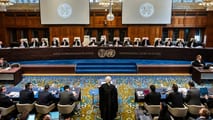The ECLJ welcomes the ECHR ruling in the case of Eglise Evangélique Missionnaire c. France
Strasbourg, February 1st 2013.
On January 31, 2013, the ECHR published its judgment in the case of Eglise Evangélique Missionnaire c. France (25502/07) condemning the French Republic for having violated the religious freedom of a French Evangelical church. In connexion with the French “anti-cult policy”, the administration imposed retroactive taxes on the hand-to-hand gifts received by the church, through a new and unforeseeable interpretation of the fiscal law. The Court held that this taxation was unforeseeable and recognized that it jeopardized the ability of the Church to conduct its activities.
The French Republic is to reimburse the church about 450.000 euros for the taxes unduly paid and for costs and expenses. The ECLJ represented the church before the European Court.
For the ECLJ, this is an important victory for both justice and religious freedom. There shall be no derogation to the rule of law; it is not acceptable to change the interpretation of the fiscal law in order to harm an association.
Founded in 1963 and registered with the Department of the Prefecture of the Doubs on December 24, 1963, the Evangelical Church of Besancon was formed under French law in accordance with the provisions of the Acts of July 1, 1901 and December 9, 1905. The Association received a receipt for its registration and proceeded to grow and develop as a congregation with several thousand members for the next thirty years. During that time, it maintained certain tax arrangements afforded to religious associations, namely:
1. Exemption from property taxes on constructed property, under Article 1382-4 of the Tax Code.
2. Reduced rate for registration of constructed property, under former Article 713 of the Tax Code.
3. Exemption from taxes on personal donations, under Article 795-10 of the Tax Code.
On December 22, 1995, a parliamentary report was published by a committee of inquiry into cults. The Association was listed as a “cult” and subject to financial auditing under the unofficial implementation of new anti-cult policy. This auditing aimed to inspect tax histories of alleged cults “with the advisability of the prosecution to be examined in a spirit of particular severity.” According to the report of February 29, 1996, the Association adopted a new name and again applied and received registration as a religious association from the Department of the Prefecture of the Doubs under the designations of the Act of 1905.
Shortly thereafter, between July 2 and September 30, 1996, the Association underwent a tax audit for the period of time between January 1, 1993 and December 31, 1995. The end result was a triple fine for the property taxes, fees for registration of constructed property, and taxes on personal donations. The administration conducting the audit had determined the Association was not “religious” and, therefore, enjoyed no tax benefits or exemptions.
The Association turned to the Tax Office (“Office”), the Department of the Prefecture of the Doubs, and eventually the court system for reprieve from the taxes and acknowledgement of its legitimate religious status.
A. Property Tax
January 14, 1997, the Office demanded back tax fees and refused to recognize tax-exempt status for the Association for its property, after an application on September 11, 1996. The refusal came from an alleged failure on the part of the Association to meet the terms of being a religious association: first, failing to meet the conditions set forth by the Conseil d’Etat in that it was not devoted exclusively to worship without disturbing public order; and second, lacking in recognition as a religious association by the public authorities.
The administrative court of Besancon held on September 16, 1999 that the Association was religious in nature and, therefore, was not required to pay back tax fees. On March 14, 2001, the Office duly relieved the Association of the property tax, notified it of its exemption of registration fees for constructed property, and returned taxes paid for the constructed property.
B. Disturbing Public Order
The Department of the Prefect of the Doubs rejected recognition of the Association’s “authorized” religious status. On August 1, 2001, the Association asked the Administrative Court in Besancon to cancel this rejection. In his defense, the Prefect offered insufficient reasons for the rejection of this recognition. He acknowledged that the Association had never been prosecuted or convicted, but he presumed it was guilty of disturbing public order based on “informal but nonetheless significant contacts undertaken discreetly” and the inference thereon that the Association “had every appearance of a cult” and that led him “to think that the elementary rights of persons in a state of weakness were seriously lacking.” (Prefect’s pleadings in defense). The Court found for the Association on October 2, 2003 on the basis of the Prefect’s insufficient proof of disturbance of public order. Shortly thereafter, on November 24, 2003, the Department of the Prefect of the Doubs “recognized” the Association through authorization of the benefits provided by Articles 200 and 238 of the Tax Code.
C. Personal Donation Tax
On September 19, 1997, the Office demanded back tax fees on personal donations made to the Association under Article 757 of the Tax Code, and then proceeded to refuse exemption on personal donations under Article 795-10 of the Tax Code. It cited that the Association could not be considered religious because of its proselytism and, therefore, was not authorized to receive personal donations. The fees amounted to € 408, 797.68 and included € 130, 230 in penalties alone.
The legal basis for this fee was as follows:
1. Article 757, Paragraph 2: Essentially, this provision requires that voluntary settlements will be subject to taxation. The Office determined that personal donations qualified as voluntary settlements, under the wording of the Tax Code.
In calculating personal donations/voluntary settlements, the Office incorrectly included loans and donations from other churches to purchase the Association’s building, providing an inaccurate estimation of the amount of personal donations subject to taxation.
2. Article 795-10: Essentially, this provision provides tax exemption on personal donations to religious organizations, unions of religious associations, and authorized congregations. The Office viewed this wording to benefit authorized religious associations who had obtained their authorization prior to receiving personal donations.
The Office claimed the Association was not religious in nature and had never been “recognized” by the public authorities, citing to both the Act of 1905 and Article 795-10 of the Tax Code. In alleged violation of the Act of 1905:
a. the Association’s articles of association did not specify the boundaries of its activities nor did its resources correspond to the Acts of 1905 and December 25, 1942, or to Decree No. 66-388 of June 13, 1966;
b. its religious activity was purely private in nature;
c. and its objectives were twofold: “worship and proselytism,” contrary to the provisions of the Act of 1905.
In appealing the Office’s rejection of its request for tax exemption on March 28, 2001, the Association subpoenaed the Director of the Tax Office to appear before the Regional Court in Besancon on May 23, 2001. The Court first established the personal donations were tax exempt, under commonly accepted interpretations of Article 795-10. Next, it turned to affirm the religious nature of the Association, holding specifically: “making the religious nature of an association dependent on any other criteria than those set out in the Act of December 9, 1905, and more particularly on its recognition by the public authorities, which may not, in respect of the provisions of the said Act, recognize any religious body whatsoever, would result in adding to the text a condition that it did not contain.” Notably, the Court clarified the definition for recognition as a religious association under Article 795-10: “there should be no confusion between the qualification of a religious association that does not depend on a decision on the part of the public authorities and the acceptance of liberalities by will or inter vivos made to such an association which, by virtue of Paragraph 6 of Article 19 of the Act of December 9, 1905 resulting from the Decree of June 13, 1966, is subject to authorization by the Prefect.”
After the ruling, the Office appealed to the Court of Appeals in Besancon. The judge did reverse the lower court’s judgment and remand the case for the lower court to state the Association did not qualify as religious in nature and, therefore, was not privy to the tax exemptions provided in Article 795-10 on November 18, 2004. This decision was made final by the Court of Cassation on December 12, 2006, and that court rejected the Association’s appeal as inadmissible. The church then turned to the European Court of Human Rights for remedy and asked for the support of the ECLJ.








